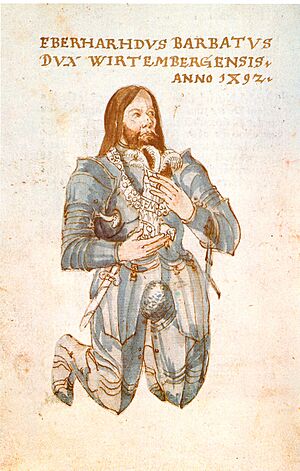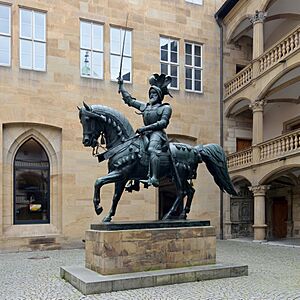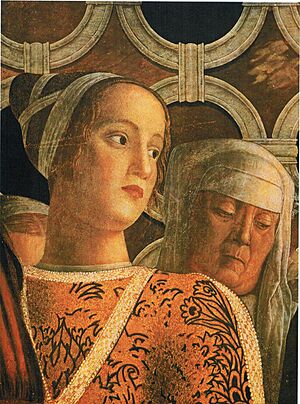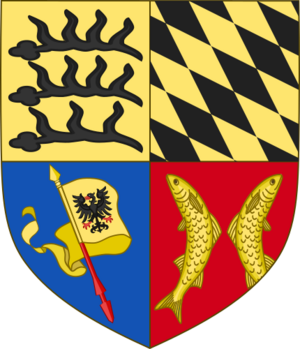Eberhard I, Duke of Württemberg facts for kids
Quick facts for kids Eberhard I |
|
|---|---|

Eberhard im Bart, 1492
|
|
| Count of Württemberg | |
| Reign | 1459 - 21 July 1495 |
| Predecessor | Ludwig I |
| Successor | Himself as Duke |
| Duke of Württemberg | |
| Reign | 21 July 1495 - 24 February 1496 |
| Predecessor | Himself as count |
| Successor | Duke Eberhard II |
| Born | 11 December 1445 |
| Died | 24 February 1496 Tübingen |
| Spouse | Barbara Gonzaga |
| Issue | Barbara |
| House | Württemberg |
| Father | Ludwig I |
| Mother | Mechthild of the Palatinate |
Eberhard I of Württemberg (born December 11, 1445 – died February 24, 1496) was an important ruler in German history. From 1459 to 1495, he was known as Count Eberhard V. Then, in July 1495, he became the very first Duke of Württemberg. He was also known as Eberhard im Bart, which means "Eberhard the Bearded."
Contents
Early Life and Adventures
Eberhard was born in a town called Bad Urach. His father was Count Ludwig I, and his mother was Mechthild of the Palatinate.
When he was still young, Eberhard officially took charge of his part of Württemberg. At that time, Württemberg was split into two areas. He had a guardian, a respected nobleman named Rudolph von Ehingen. But in 1459, Eberhard decided he was old enough to rule on his own. He became Count Eberhard V of Württemberg-Urach.
For a while, Eberhard didn't focus much on his duties. He lived a bit carelessly until 1468. During this time, a special book about fencing was even made for him!
A Journey to Jerusalem
In 1468, Eberhard went on a journey to Jerusalem. There, he became a knight of the Order of the Holy Sepulchre. To remember this trip, he chose the palm tree as his personal symbol. He also visited Italy and met many famous scholars.
When he returned home, he married a very important bride. Her name was Barbara, and she was the daughter of a powerful Italian ruler. They had one child, a daughter also named Barbara, but she sadly passed away when she was very young.
Founding a University
Eberhard had a motto: attempto, which means "I dare." In 1477, he showed his daring spirit by founding the University of Tübingen. This was a big step for education in his land.
He also invited religious groups, like the Brethren of the Common Life, to his country. He built many churches and showed great interest in improving religious life. Even though he couldn't speak Latin, he valued learning a lot. He had many Latin books translated into German so more people could read them. He had a very large library, and some of his books are still around today!
Uniting Württemberg
A very important moment in Eberhard's rule happened on December 14, 1482. He managed to bring together the two separate parts of Württemberg: Württemberg-Urach and Württemberg-Stuttgart. He did this with his cousin, Eberhard VI, by signing the Treaty of Münsingen. After this, he moved the capital city to Stuttgart.
Eberhard was a peaceful ruler, but he also helped create the Swabian League in 1488. This was a group of powerful states that worked together for safety. He even helped free Maximilian I, who later became the Holy Roman Emperor, when Maximilian was held captive. In 1492, Maximilian gave Eberhard a special award called the Order of the Golden Fleece.
Becoming a Duke
The biggest change for Württemberg happened on July 21, 1495. At a big meeting called the Diet of Worms, the County of Württemberg was officially made a Duchy. This meant Württemberg became a more important and powerful state.
During the ceremony, Eberhard was dressed as a Duke and given a sword by Emperor Maximilian. This confirmed the new status of Württemberg. Eberhard I was now the first Duke of Württemberg! This new title placed Württemberg higher in importance than many other states in the Holy Roman Empire.
Eberhard I passed away in Tübingen in 1496. His cousin, Eberhard II, became the next Duke. Eberhard I was first buried in a church called Saint Peter auf dem Einsiedel, and later in the collegiate church of Tübingen.
Legacy
Eberhard I is remembered as a beloved ruler. In the 19th and 20th centuries, people praised him as a great leader. There's even a statue of him in a famous German memorial called Walhalla.
In a popular Swabian song, "Preisend mit viel schönen Reden," Eberhard is called "Eberhard the one with the beard, Württemberg's beloved ruler." The song says he was the richest prince because he could trust all his people and rest his head on their laps without fear.
 | Shirley Ann Jackson |
 | Garett Morgan |
 | J. Ernest Wilkins Jr. |
 | Elijah McCoy |




